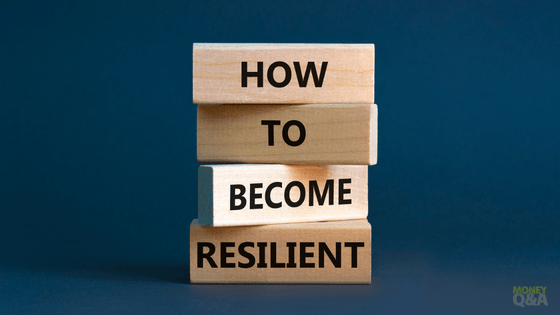
What is financial resilience? Financial resilience refers to the ability of an individual to withstand financial shocks and maintain a stable financial situation despite unexpected events. And there are several great ways that you can work to build financial resiliency.
Financial resilience encompasses factors such as having an emergency fund, diversifying investments, reducing debt, and having a solid financial plan. Financial resilience allows individuals and organizations to weather financial storms, bounce back quickly from financial setbacks, and confidently pursue long-term financial goals.
An individual can gain financial resilience by taking the following steps:
- Building an emergency fund: Having enough money set aside for unexpected events, such as job loss or medical expenses, can help to provide financial stability during tough times.
- Reducing debt: High levels of debt can be a significant source of financial stress. By paying down debt, individuals can reduce their financial burden and increase their financial stability.
- Diversifying investments: Investing in various assets can help reduce risk and increase the chances of achieving long-term financial goals.
- Budgeting: By tracking spending and creating a budget, individuals can identify areas where they can cut back on expenses and increase their savings.
- Planning for the future: Having a clear financial plan that considers short-term and long-term financial goals can help individuals stay on track and make informed financial decisions.
- Building a diverse source of income: Having multiple income sources can help reduce financial stress and increase financial stability.
- Seeking professional advice: A financial advisor can help individuals to understand their financial situation and create a plan that meets their specific needs and goals.
Building an Emergency Fund
Building an emergency fund provides financial resilience by creating a safety net for unexpected events. An emergency fund can help individuals handle unexpected expenses, such as medical bills, job loss, or car repairs, without relying on high-interest debt. This can reduce financial stress and provide peace of mind during difficult times.
An emergency fund also allows individuals to maintain their standard of living and continue to meet their financial obligations, even in the face of unexpected events. This stability can help reduce the risk of debt and prevent long-term financial problems.
By having an emergency fund in place, individuals can be more confident and secure in their financial situation, knowing they have a source of financial support to fall back on in times of need. Building an emergency fund can provide a foundation for financial resilience and help individuals pursue their long-term financial goals more confidently.

Reducing Debt
Reducing debt can give individuals financial resilience by decreasing their financial obligations and increasing their financial stability. High debt levels can be a significant source of financial stress, as it can limit an individual’s ability to meet their monthly expenses and pursue their financial goals.
Individuals can free up more of their income by reducing debt for other purposes, such as saving, investing, and building an emergency fund. This increased financial flexibility can help individuals weather financial shocks and maintain their standard of living, even during tough times.
Reducing debt can also help individuals to reduce their financial risk, as it reduces their dependence on credit and makes them less vulnerable to interest rate changes and other financial shocks. This increased financial stability can provide a foundation for financial resilience and help individuals to pursue their long-term financial goals with greater confidence.
Reducing debt can give individuals financial resiliency by decreasing their financial obligations, increasing their financial stability, and reducing their financial risk.
Diversifying investments
Diversifying investments can provide financial resilience by reducing risk. When an individual invests their money in a variety of assets, such as stocks, bonds, and real estate, they spread their risk across multiple investments. This can help to protect their portfolio from significant losses if one investment underperforms.
Diversification can also help individuals to benefit from a range of market conditions and investment opportunities, increasing the chances of achieving their financial goals. By investing in a variety of assets, individuals can increase their returns while reducing their risk.
A diversified portfolio can also help individuals be more financially resilient during economic downturns or market volatility. When one asset class is underperforming, investments in other asset classes may be performing well, helping offset losses and maintain the portfolio’s overall value.
Diversifying investments can provide financial resilience by reducing risk, increasing the chances of achieving financial goals, and helping to withstand market downturns and volatility.
If you’re looking for places to keep traditional investment accounts, you might want to check out investing with M1 Finance, Robinhood, Betterment, or Stash Invest.
M1 Finance simplifies the investment process for beginning and experienced investors alike. M1 Finance does not charge a fee per trade, and it gives you the option of taking more control over your investments if you want them (and less if you don’t). M1 Finance is great for buy-and-hold investors.
Budgeting
Budgeting can provide financial resilience by increasing individuals’ control over their finances and helping them make informed financial decisions. By tracking their spending and creating a budget, individuals can better understand their financial situation and identify areas where they can cut back on expenses.
Budgeting can also help individuals prioritize their spending and ensure that their money is spent on the things most important to them. By allocating their money toward their priorities, individuals can improve their financial stability and reduce the risk of financial stress.
Budgeting can also provide a framework for individuals to save and invest in their future. By setting aside money for their financial goals, such as building an emergency fund or saving for retirement, individuals can take control of their finances and increase their financial resilience.
Budgeting can provide financial resilience by increasing financial control, helping individuals prioritize their spending, and providing a framework for saving and investing for the future.
Planning for the Future
Planning for the future can provide financial resilience by helping individuals to prepare for life’s uncertainties and reach their long-term financial goals. By setting financial goals and creating a plan to achieve them, individuals can take a proactive approach to their finances and increase their chances of success.
Planning for the future can also help individuals to be more prepared for unexpected expenses and life events, such as job loss, illness, or retirement. By having a plan in place and saving for these events, individuals can increase their financial stability and reduce the risk of financial stress.
Additionally, planning can help individuals make informed financial decisions and prioritize spending. By understanding their financial situation and knowing their goals, individuals can make choices that align with their long-term financial interests, improving their financial stability and resilience.
Planning for the future can provide financial resilience by helping individuals prepare for life’s uncertainties, reach their long-term financial goals, make informed financial decisions, and prioritize their spending.
Diverse Sources of Income
Diversifying your sources of income helps you to be financially resilient by spreading your financial risk across different sources of income. This means that if one source of income were to dry up or decrease, you would have other sources of income to fall back on. This can help you to weather financial storms and maintain a more stable financial situation overall.
There are many reasons why it is important to have multiple streams of income. Here are a few of the most important:
- Increased financial security. If you have only one source of income, you are at risk of financial hardship if you lose your job, become disabled, or experience other unexpected events. Having multiple streams of income can help you to weather these storms and protect your financial security.
- Greater financial freedom. Having multiple streams of income can give you more financial freedom. You may be able to choose to work less, retire early, or pursue other interests if you have multiple sources of income.
- Increased wealth creation. The more sources of income you have, the more money you can potentially make. This can help you to reach your financial goals more quickly, such as saving for retirement, buying a home, or starting a business.
- Reduced risk. If you have multiple streams of income, you are less likely to experience financial ruin if one of your income streams dries up. For example, if you lose your job, you can still generate income from your other sources.
- More options. Having multiple streams of income gives you more options in life. You may be able to choose to work in a field that you are passionate about, even if it doesn’t pay as well as another field. You may also be able to take more risks, such as starting a business because you have a backup plan if things don’t work out.
Additionally, having multiple sources of income can also provide you with additional opportunities for growth and financial stability, as you can invest in new sources of income that have the potential to grow and provide you with more financial security.
Seeking Professional Advice
Seeking professional help can give you financial resilience by providing you with the knowledge and guidance needed to make informed financial decisions. Financial professionals, such as financial advisors or accountants, can help you to create a comprehensive financial plan that considers your current financial situation, goals, and risk tolerance. They can also help you to understand complex financial concepts and strategies and provide you with advice on how to manage your money more effectively.
Additionally, they can help you to identify and mitigate financial risks and provide you with ongoing support and guidance as your financial situation evolves over time. By working with a financial professional, you can have the confidence and peace of mind that comes from knowing that your financial future is in good hands.
Gaining financial knowledge helps you to achieve financial resiliency by providing you with the tools and understanding needed to make informed financial decisions. When you have a solid understanding of financial concepts, such as budgeting, saving, investing, and managing debt, you are better equipped to make decisions that support your financial well-being.
Financial knowledge also helps you to understand how your financial decisions impact your overall financial situation, both in the short and long term. With this understanding, you can make informed choices that help you to build and maintain financial stability, even during uncertain economic times.
Furthermore, being knowledgeable about personal finance gives you the power to take control of your finances and make informed choices that help you to reach your financial goals and build a secure financial future.
Financial stress is a major source of stress for many people. When you are financially resilient, you have a safety net in place, and you are better equipped to handle unexpected expenses, reducing financial stress, and increasing peace of mind.
Financial resiliency allows you to have financial stability, which can translate into a better quality of life. This can include being able to afford the things you need and want and having the freedom to pursue your passions and interests without financial stress.
Life is unpredictable and financial shocks, such as job loss, unexpected medical expenses, or market downturns, can happen to anyone. Financial resilience helps you to weather these storms and protects you from financial ruin.
Building financial resiliency takes time, but the benefits last a lifetime. Financial resilience helps you to build a secure financial future and achieve financial independence, so you can live the life you want in the long term.
And financial resilience is important for personal, financial, and overall well-being. Financial resiliency provides a sense of security, reduces stress, and helps you to achieve your financial goals and live the life you want.
What about you? How do you build financial resiliency in your life?
